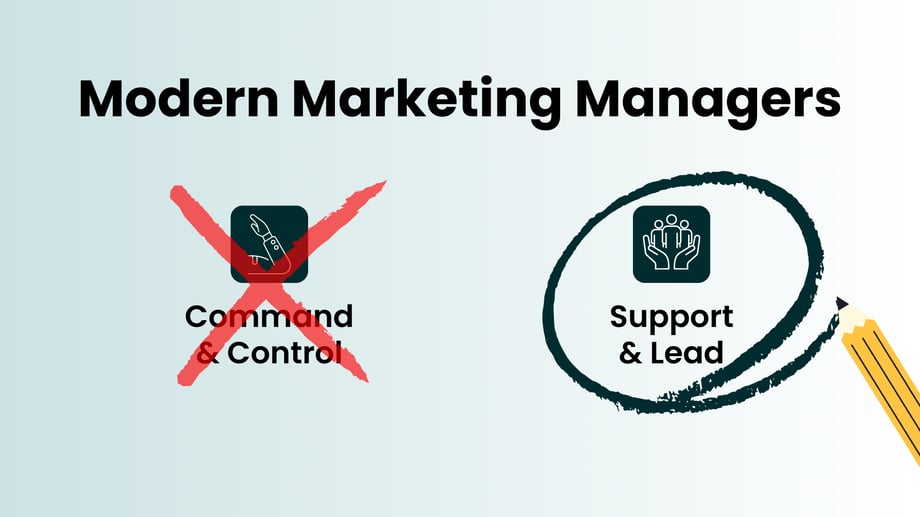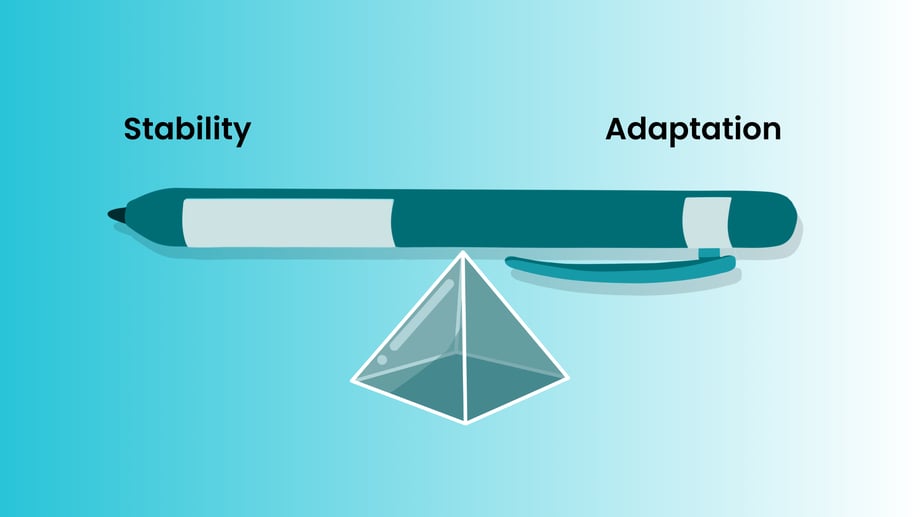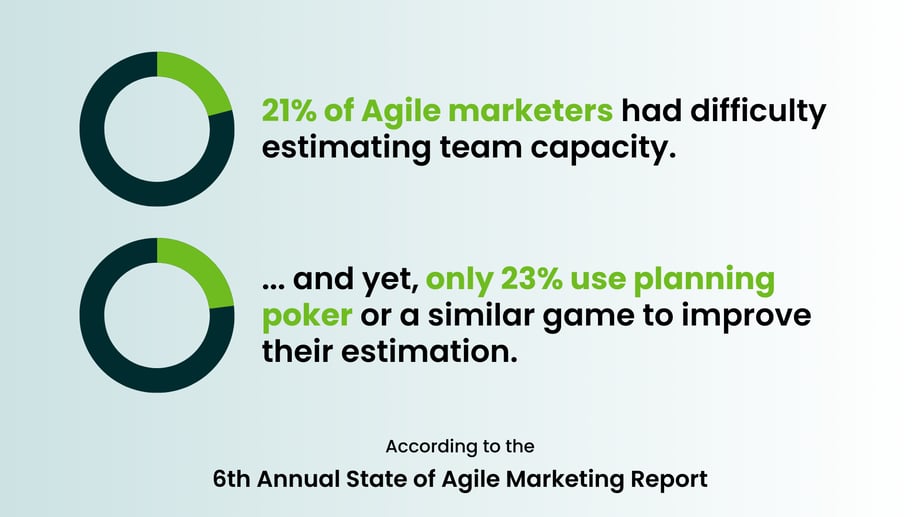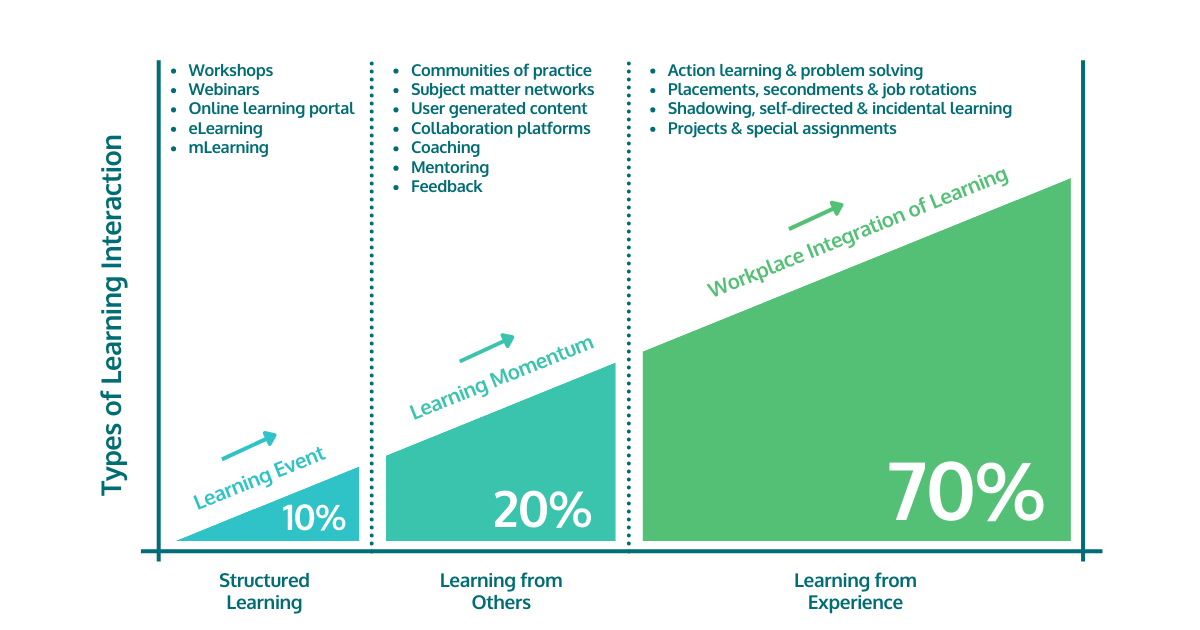Improve your Marketing Ops every week
Subscribe to our blog to get insights sent directly to your inbox.
Confront your process problems head on with a Sherpa by your side.
Explore support options that are tailored to meet you wherever you are on your climb.
Browse our pioneering Agile marketing courses
Learn from the stories of marketers already on the road to process improvement.
Featured Resource

State of Agile Marketing
Learn from 8 years of study on how marketers are increasing their agility.
Download Report
The list of challenges marketers are facing at the outset of 2026 is long and complex.
Budgets are tightening while expectations keep rising. AI is reshaping workflows faster than teams can adapt. New tools get launched every month, adding complexity instead of clarity. Customer behaviors shift overnight, competitors move quickly, and marketing talent continues to churn at an alarming rate.
In this environment, even top marketing leaders feel stretched thin, pulled in multiple directions and struggling to prioritize what really matters. Keeping your head above water is hard enough; leading a team to consistently deliver results can feel nearly impossible.
That’s why effective and efficient marketing management is no longer optional.
Nearly every modern marketing challenge like misaligned priorities, burnout, stakeholder chaos, inefficient processes, and poor execution traces back to how we manage our people, workflows, and resources.
By improving your marketing management approach, you will be able to unlock the ability to tackle everything else that’s holding your team back. Before we get to that, let’s have a quick refresher on what marketing management is all about.
In short, marketing management comes down to planning, organizing, executing, and optimizing all the activities that help an organization reach its audience and achieve its business goals. At its core, marketing management is about deciding what your team should focus on, how work should get done, and how to allocate limited resources for the greatest impact.
In practice, modern marketing management goes far beyond coordinating campaigns. It includes balancing strategic priorities, enabling optimal team performance, managing stakeholders, adapting to fast-moving conditions, and using data to guide decisions.
Effective marketing management brings clarity to chaos, ensuring your team works on the right things, in the right way, at the right time.
Ultimately, it’s the system that keeps marketing aligned, accountable, and capable of delivering consistent value, even as the landscape continues to shift.
With that in mind, let’s have a look at the core functions of marketing management in a little more detail.

While every marketing team looks different, the core functions of marketing management remain consistent. They form the foundation that allows managers to navigate complexity, support their teams, and keep work aligned with business goals.
Marketing management begins with defining clear goals, priorities, and success measures. This includes understanding the market environment, aligning with organizational objectives, and ensuring the team knows why their work matters.
With limited time and resources, marketing managers must determine what to work on first. This involves building realistic plans, sequencing work, balancing urgent needs with long-term initiatives, and adapting those plans as conditions change.
From day-to-day workflows to cross-functional collaboration, marketing managers are responsible for creating an environment where teams can do their best work. This includes establishing processes, removing obstacles, enabling autonomy, and maintaining a sustainable pace.
Execution isn’t just “getting things done.” It’s coordinating moving pieces across content, campaigns, technology, analytics, and stakeholders. Effective managers ensure work progresses smoothly, blockers are addressed quickly, and quality remains high.
Strong marketing management requires consistent measurement. By tracking performance, analyzing insights, and using feedback loops, managers can make better decisions and continuously improve how the team operates.
Marketing rarely works in isolation. Managers must bridge communication gaps with sales, product, leadership, and external partners. Alignment ensures that expectations are clear, requests are controlled, and marketing can stay focused on delivering value.
Taken together, these functions provide a structured way to lead a team, adapt to change, and elevate marketing performance, no matter how complex the environment becomes.

The role of marketing managers has changed.
In the past, marketing management was largely about command and control. You told team members what the priorities were, and expected them to follow the lead you set.
Today, that’s changed a lot (and for the better!)
Modern marketing managers rely far more on guiding and harnessing the capabilities of their teams. It’s a transition from the “boss who tells everyone what they should be doing” to a support role focused on guiding and supporting team members to provide the most value for the organization and its stakeholders.
In many cases, this involves literally changing a title from “marketing manager” to something like “marketing owner.”
But regardless of the title, modern marketing management should center around using technology, tools, and processes to build a culture that delivers value. Often that means leading by example, building consensus and alignment around goals, and focusing more on ensuring your team has the resources they need to succeed.
Obviously, this constitutes a substantial shift for many managers used to really being in the driver’s seat. But it’s a shift that’s increasingly critical for marketing success as those older management styles are increasingly leading to higher turnover, poorer ROI, and generally less efficient teams.
Now let’s have a look at how this shift in marketing management affects various aspects of how these teams function.
Getting your marketing strategy right has never been harder for most marketers. On the one hand, with budgets tighter than ever and leadership laser-focused on ROI, you’ve got lots of pressure to plan ahead to maximize how you’re using your limited resources.
On the other hand, the business environment is changing faster than ever, constantly throwing wrenches into those carefully laid strategies. What’s a modern marketing manager to do?
Start with rethinking your planning cycles. Sure those quarterly or even annual marketing strategies might seem alluring, enabling you to plan your work well in advance and optimize everything possible. But the reality is usually quite different.
Instead of creating rigid plans that are inevitably going to get hit with reality months in advance, shortening your planning cycle offers more benefits than you might think. Shorter cycles offer more opportunities to pause, reflect on lessons learned, and incorporate those lessons into your marketing.
It also means you’re better able to adapt and change when circumstances demand it. By balancing stability and adaptation it’s possible to get the best of both worlds. The key is being deliberate about how you manage that change instead of relying on ad hoc processes.

Overall, it’s vital to evolve how you do your strategic marketing planning if you’re going to remain effective.
Marketing processes may not get a lot of attention but they are the foundation of everything we do.
Trying to improve performance in other areas without a solid foundation of quality processes is a bit like trying to tune and optimize the engine of a car with a flat tire. You can try all the hot new marketing techniques you want but if your team is being held back by bad processes, you’re just not going to get the results you want.
Any marketer will know what it feels like to try and work with bad processes. Work takes longer than it should, time gets wasted because it’s unclear what needs to be done, and team morale usually takes a hit as a result.
But what can marketing managers do?
In some cases, you might have a dedicated marketing operations individual or team to work on this. In other cases, marketing managers themselves may need to oversee process improvements directly. Often this can be done through regular retrospectives, where team members can shout out processes that need improvements before developing and testing ideas to improve them.
Just remember that process improvement is also about more than just telling everyone to do things differently. It requires testing and iterating to find the best way to get things done.
Even the best, most brilliant, and most efficient marketing teams can be utterly wrecked by bad stakeholder management. That could be someone from senior management jumping in to tell everyone that they need to change priorities or try a new strategy they just heard about on a podcast. Or it could just be a sales team that makes unreasonable requests with tight deadlines, throwing the team into chaos.
In either case, good marketing management requires shielding teams from distractions as well as managing those relationships more effectively. That may require using Service Level Agreements (SLAs) to formally write down and agree on how that relationship will function. For example, that marketing needs a certain amount of time to get work out, or that you only evaluate new work to decide whether it’s going to be a priority at bi-weekly meetings.
But however they approach it, marketing managers need to be gatekeepers, acting as advocates for their teams and protecting them from distractions and unplanned work.
The last thing to mention here is the importance of managing capacity. This covers both ensuring your team can actually deliver the work it promises and ensuring you’re not overworking the members of that team to the point of burnout.

The good news here is that improving how you estimate your workload and manage your capacity isn’t all that complicated. Games like planning poker reliably improve the accuracy with which we estimate how much work is required to complete a task. So just by incorporating it into your planning process, you can improve how often you deliver work on time.
Then there’s the question of how much your team should be working. It’s important to remember that if your teams are operating at 100% capacity, they are not being efficient. In reality, they’re in a precarious position because if any emergency comes up, someone gets sick, etc. your team will not have the capability to handle that change.
In addition, working at 100% capacity is exhausting and leads to burnout. Considering how often burnout leads to team members leaving, it’s worth remembering that filling a vacancy typically costs around 15-25% of the position’s annual salary. With marketing budgets tighter than ever, spending thousands to replace a team member when you might have kept them otherwise is just not a good use of your resources.
It’s best to try and get people to work at around 70% of their maximum capacity. This ensures they can sustain the pace and helps avoid costly burnout.

Before moving on to learn the importance of training, why don't you take a second to grab our Agile Marketing Quick Start Guide?
A marketing manager oversees the planning, execution, and optimization of marketing activities. Their role includes setting strategic priorities, coordinating campaigns, managing team workflows, enabling collaboration, tracking performance, and ensuring marketing efforts support the organization’s goals. In practice, they are both strategists and facilitators, guiding the team while removing obstacles that slow them down.
Marketing in 2026 is defined by rapid technological change, tighter budgets, talent shortages, and constantly shifting customer expectations. Strong marketing management helps teams stay focused, aligned, and adaptable. Without it, work becomes reactive, priorities shift unpredictably, and teams quickly burn out. Effective management creates clarity, stability, and a sustainable pace in an increasingly chaotic environment.
Today’s marketing managers need a blend of strategic, operational, and interpersonal skills. These include prioritization, clear communication, stakeholder alignment, decision-making, capacity planning, process improvement, and performance measurement. Equally important are leadership skills such as empathy, coaching, collaboration, and the ability to guide teams through complex, fast-moving work.
Marketing management focuses on planning, organizing, and optimizing the work itself, the systems, processes, and priorities. Marketing leadership centers on inspiring, guiding, and empowering people. The two overlap, but great managers combine both: they create effective systems while also fostering a culture of trust, accountability, and continuous improvement.
Common challenges include managing constant change, balancing long-term strategy with short-term demands, dealing with tool overload, aligning with stakeholders, handling unplanned work, measuring performance accurately, and preventing burnout. These pressures make it difficult to maintain focus, consistency, and team morale without strong management practices in place.
The key is prioritization and capacity management. High-performing teams limit work in progress, focus on the highest-impact tasks, and use short planning cycles to stay adaptable. Clear processes, collaborative workflows, and regular retrospectives help teams optimize how work gets done, even when budgets or staff capacity are tight.
Useful tools typically include project management platforms (such as Asana or Jira), shared planning tools (like Miro or Notion), analytics dashboards, marketing automation systems, and collaboration tools such as Slack or Microsoft Teams. The best tools support visibility, communication, alignment, and streamlined workflows without adding unnecessary complexity.
Agile gives marketing teams a structured way to stay flexible in a fast-moving environment. It emphasizes short planning cycles, clear priorities, continuous improvement, and sustainable pace, all of which help teams deliver value more consistently. For managers, Agile reduces chaos, sharpens focus, and fosters a culture of ownership and accountability.
Burnout prevention starts with realistic capacity planning. Teams perform best when they operate at about 70% of their maximum load, leaving room for unexpected work and emergencies. Managers should monitor workload, eliminate unnecessary tasks, limit multitasking, and protect their teams from constant interruptions or last-minute demands.
The most important metrics vary by organization, but common ones include pipeline contribution, campaign performance, customer engagement, conversion rates, time-to-market, workload predictability, and team throughput. Operational metrics (like cycle time and lead time) help managers understand how work flows, while outcome metrics reflect the impact of marketing efforts.
IMAAAAAAAAAAAAAAAAAAAAAAAAAAAAGEEEEEEEEEEEEEEEEEEEEEEEEEEEEEEEEEEEEEEEE
Okay, so now you’re aware of all the various ways you can improve your marketing management. But how do you actually learn those skills? The sad reality is that trying to navigate through the complex challenges we’ve laid out while doing this is often a recipe for more exhaustion, decision fatigue, and ultimately burnout.
Yet, our own surveys have shown that coaching, training, and certification courses are some of the most valuable tools marketers have. The key is finding the right blend of learning types while minimizing the burden on your time and capacity. Doing that begins with taking a scientific approach to learning.
When we think back to the 10+ years nearly all of us spent in school, chances are a lot of what we learned was long gone shortly after we learned it. Yet, other lessons have almost certainly sunk in and remain with us even decades later. So what really leads to the widely different outcomes?
Researchers have found that one of the main factors is how we apply our knowledge. For example, if you learned something like the Pythagorean theorem and never used it again, you’ll likely forget it. But if you learned it and then had a job where you used it regularly, you’ll almost certainly remember it.
So how can marketing managers apply this?
Through the 70-20-10 model, where 10% of your time is spent in structured learning like classes, another 20% is spent working with coaches and getting feedback, while the remaining 70% is spent actively applying those concepts in your marketing management.

This balance helps ensure you get the important concepts, learn how to apply them to your unique circumstances, and take the time to test and adjust them as needed. The result is a learning model that ensures your time is well spent building concepts and skills that will stick with you and deliver value over the long-term instead of being quickly forgotten.
We’ve mentioned how it can be difficult to manage all of the various elements required for better marketing management. The good news is that there’s a single approach which unites them all: Agile marketing.
This is a mindset and approach that works as a foundation for modern and effective marketing management. By combining flexibility with a rigorous approach to iterative improvement, Agile enables marketing managers to adapt to the fast-changing world we all face. Best of all, it helps develop a culture of autonomy and accountability that should reduce the workload of managers who are used to “swooping in” to solve problems regularly.
Unlocking that additional time enables managers to shift their focus to other things that can really move the needle, whether that’s strategic planning, process improvement, or developing their own skill sets.
But unlocking all of these benefits requires cultivating a specific kind of mindset and leadership style.
By now it should be clear that the foundation of better marketing management is effective Agile leadership. Years of surveys and research have consistently shown that Agile teams outperform their traditional counterparts on a range of metrics. The challenge is finding an effective way to reach that state.
A great place to start is with a course on Agile Marketing Leadership. Depending on where you are in your journey, this can be a self-paced course or a full certification course with an experienced trainer. Within a few weeks, you can be equipped with all the basic concepts and tools you’ll need to begin unlocking all the benefits Agile offers.
Before moving on, don't forget to get our Agile Marketing Quick Start Guide.
Subscribe to our blog to get insights sent directly to your inbox.
Subscribe to our blog to get insights sent directly to your inbox.